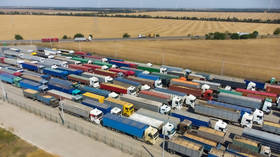
Poland will close off its market to protect its farmers, officials have warned

© Getty Images / Avalon_Studio
Poland has threatened to introduce an indefinite embargo on supplies of Ukrainian grain if the EU does not extend its own bloc-wide import ban. Warsaw’s minister of economic development and technology, Waldemar Buda, said the measure could enter force at midnight on Friday.
A temporary EU ban on Ukrainian grain imports, introduced after Poland and four other Eastern EU countries complained about cheap Ukrainian produce flooding the market, is set to expire on September 15.
“If the European Commission does not make a decision on the issue of [banning imports of] Ukrainian grain, Poland will make its own at midnight. It [the ban] will be indefinite,” the minister said.
Echoing the remarks, Polish Minister for EU Affairs Szymon Szynkowski vel Sek stressed that his country would protect the interests of its farmers “one way or another,” regardless of whether a decision was made at EU or national level.
“The decision [to ban Ukrainian agriculture produce] was made by the Council of Ministers. On Tuesday, the resolution was unanimously adopted. We intend to introduce a national import ban if such a measure would not be introduced at the EU level,” Szynkowski vel Sek warned.
Poland would not be satisfied with another temporary extension of the embargo on Ukrainian grain, and is expecting “structural decisions” from the European Commission, Agriculture Minister Robert Telus warned earlier on Friday.

“We should resolve this for the future. We need tools for future cooperation between Ukraine and the EU,” the minister urged.
In May, Poland, Hungary, Romania, Bulgaria, and Slovakia imposed a sweeping ban on Ukrainian grain imports. The move came after Brussels suspended customs duties on all agricultural produce from Ukraine for one year, to support the nation’s economy. However, a glut of cheap Ukrainian grain left EU producers struggling against what they viewed as unfair competition.
Telus said Ukrainian agricultural products should be sent to the destinations they were typically delivered to before the conflict with Russia broke out last year, adding that they “cannot constantly flood Europe.”
Farmers in the five EU countries most affected claim they have suffered substantial losses due to the surge in imports of Ukrainian agricultural produce, which was initially destined for Africa and the Middle East.
For more stories on economy & finance visit RT’s business section




